Key Takeaways
Liberation is not an individual journey—it’s a collective process. True freedom requires dismantling systems of oppression that thrive on division and isolation.
Community offers accountability, shared resources, and resilience. It is where we practice the world we want to build.
Lived experiences are necessary to witness others' journeys, and collective action and care have led to liberation in these communities, particularly in Black, Indigenous, and other marginalized communities.
Why Community is Essential to Liberation Work
Today marked Day 1 of 100 Days of Community, and we began by exploring a fundamental question: What does community mean in liberation work? It’s a question that sits at the very heart of our shared journey, and the answer is as expansive as it is deeply personal. Here are the reflections and takeaways we uncovered together:
Community as the Foundation of Liberation
Liberation is not something we can achieve alone. Oppressive systems thrive on isolation, division, and the myth of individualism. For example, during the era of chattel slavery, enslaved people were deliberately separated from their families and communities as a means of control and to erode their sense of collective identity. This intentional isolation served to uphold systems of oppression by severing bonds of solidarity and resistance. True freedom comes when we dismantle those systems together.
But let’s be honest—this is also grief work. We are grieving the harm caused by separation, the trauma inflicted by systems that thrive on our disconnection from one another. It’s a grief many of us carry in our bodies, passed down through generations. And yet, in community, we find the salve for that pain. Community offers us:
Accountability: A space where we can challenge one another and hold each other to our shared values.
Resilience: Strength through collective care, where we share burdens and celebrate wins together.
Resources: The wisdom, skills, and energy of many, combined to create something greater than any one person could achieve alone.
History offers countless examples of how communities have stood as pillars of resistance. From the Civil Rights Movement to mutual aid networks, it is through intentional connection that liberation becomes possible. Community is where grief meets hope, and where trauma can begin to heal.
Reframing Individualism
Supremacy culture teaches us to idolize independence and individual achievement, but this is a carefully constructed myth designed to disconnect us from one another. Liberation work calls us to embrace interdependence—to recognize that our humanity and freedom are tied to those around us.
Consider this: individualism hoards power and perpetuates hierarchies, while community builds bridges and redistributes resources equitably. When we reject the myth of "going it alone," we open ourselves to the possibility of transformation through collaboration. This is not easy work—we’re unlearning what we’ve been taught to believe about strength and worth—but it is necessary.
Imagining Community as a Liberated Space
Community isn’t perfect, and it’s not free of conflict. But it can be a space where we show up authentically and are seen, heard, and valued for who we truly are.
Intentional communities can actively reject the pillars of supremacy culture, such as:
Perfectionism: Embracing vulnerability and growth over the pressure to "get it right."
Power hoarding: Sharing leadership and decision-making to ensure equity.
Individualism: Centering care, collaboration, and mutual responsibility.
When we commit to building systems rooted in equity, care, and accountability, we create spaces where liberation is not just a dream—it is practiced and lived. These spaces allow us to hold each other through the grief and trauma of what we’ve endured, while offering the hope of what we can build together.
Reflection
At the end of today’s live, I invited attendees to reflect on these questions:
What does community mean to you? For example, community might mean finding a space where you feel safe to be your authentic self, knowing that others will both challenge and support you as you grow. It could look like neighbors showing up for each other in times of crisis, or a group of people coming together to dismantle systems of oppression through collective action. What does it mean for you?
How can you start fostering liberation in your own spaces?
These reflections are powerful starting points for the work ahead. Community isn’t something we simply exist in; it’s something we cultivate with intention. It’s where we find the courage to be honest about our pain, and where we begin to envision a new way forward.
The First 10 Days
The first 10 days of 100 Days of Community will be shared with everyone as we lay the foundation for this journey. After that, the sessions will continue exclusively for paid subscribers. During these 10 days, I am offering 20% off for the year.
If financial barriers exist, please email scholarships@desireebstephens.com. Liberation work must remain accessible.
Here’s what the first 10 days will cover:
What Does Community Mean in Liberation Work?
Unpacking Individualism: Why We Need Each Other.
How Supremacy Culture Disconnects Us—and How to Rebuild Trust.
Understanding the 15 Pillars of Supremacy Culture.
Recognizing Internalized Oppression in Ourselves.
Naming and Addressing Privilege in Community.
What’s Possible When We Prioritize Collective Care?
The Role of Ancestral Wisdom in Building Community.
How Cultural Practices Can Heal Disconnection.
Liberation Begins with Listening.
A Teaser for Day 2: Unpacking Individualism
Tomorrow, we will explore the myth of individualism and why we need each other more than ever. Together, we will consider how we can unlearn the narratives that isolate us and reimagine individualism as interdependence, where collaboration and care become acts of resistance. How does individualism harm not just communities but also our sense of self? What does it mean to shift from "me" to "we" in a world designed to keep us disconnected?
I can’t wait to continue this journey with you as we uncover the ways intentional connection can transform both ourselves and the systems around us.
Join me live tomorrow morning for Day 2 of 100 Days of Community. Let’s unpack individualism and begin building bridges that bring us closer to liberation.
In solidarity and liberation,
Desireé B. Stephens
Educator | Counselor | Community Builder
Founder, Make Shi(f)t Happen
Join me for my next live video 9:30 am EST in the app






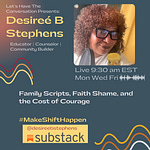


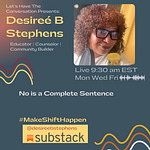

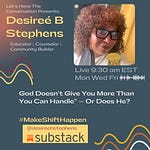
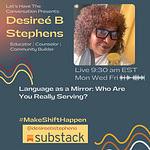
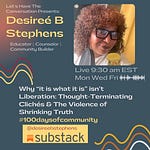
Share this post